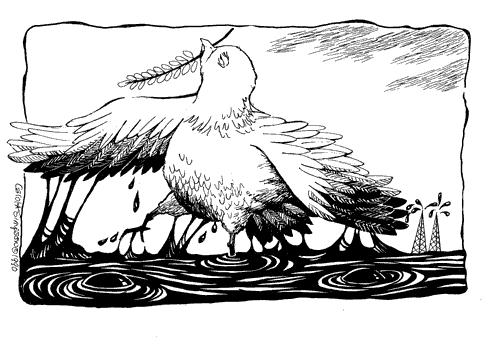Having just arrived home from Kenya -
summed up at TH!NK3 in Touching. Brutal. Unfair. - I instantly find two stories from Kenya in my search alerts and one Ecowar-like post on the new TH!NK blog.
First,
Photo District News / An Under-Reported War Over Water is an interview and background article about photographer Evan Abramson’s recent project called
When the Water Ends: Africa’s Climate Conflicts. I have already mentioned Abramson's photos and short film and in fact borrowed a few seconds for
my little Ecowar trailer.
Because of drought, the north end of Lake Turkana has retreated from southern Ethiopia into northern Kenya in the last 35 years. Abramson says there are unconfirmed reports that the Ethiopian government is arming indigenous tribes near its border with Kenya and encouraging them to assert their rights to the lake as it retreats. The Kenyan government, meanwhile, is disarming tribes within its borders, making them vulnerable to raids from Ethiopian tribes.
Adventurous photographers and journalists really should read this article about the production of Abramson's
When the Water Ends. 7000 USD and one Canon EOS camera and the project began!
Secondly, Kenyan
Daily Nation / Land conflict simmers in Rift Valley reports of futile government attempts to solve internal refugee issues.
The violence that rocked Likia in Njoro District on February 2 brought to the surface the simmering conflict over land in the Rift Valley [...] 70-year-old Kuria Wakaba was hacked to death and seven others critically injured brought to the fore the stark reality of unresolved land-based animosities. [...] The government had planned to resettle 850 families living in a camp in Nakuru town on a 2,400-acre piece of land in Mau Narok by December 31 last year. But the plan was put on hold when members of the Maasai community opposed it. [...] Clashes over land use and ownership have been fuelled by politicians for their own benefit since the restoration of multiparty democracy in 1991 [Irin, a UN-affiliated humanitarian news and analysis agency says...] vast tracts of arable land in the Rift Valley were designated as White Highlands and reserved for European settlers during British rule. The pastoralist communities, mainly the Kalenjin and Maasai, were edged out. [... later, during Kenyan government administration] many well-connected politicians were illegally allocated public land.
Thirdly, a new blogger has appeared at the TH!NK platform with the bold postulate that water scarcity may contribute to future conflicts in the Middle East:
TH!NK5 / Water politics and Middle East: a growing conflict. A new friend...



